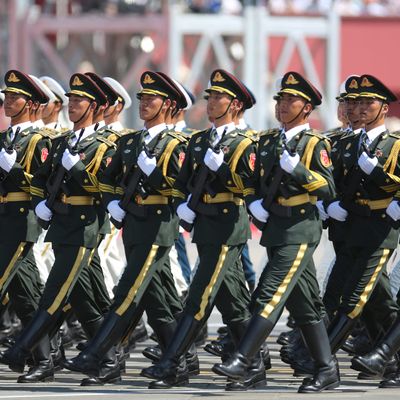
This week, American and South Korean troops gathered for their annual simulation of a war with North Korea. Pyongyang promptly got into the spirit of the season — and fired barrages of missiles in the general direction of U.S. military bases in Japan.
The U.S. responded to this display by beginning to deploy its advanced anti-missile battery system — Terminal High Altitude Area Defense (THAAD) — to South Korea.
China believes THAAD could be used to spy on its airspace. And so, it responded to America’s move by by threatening sanctions against Seoul — and, then, imploring North Korea and the U.S. to suspend their belligerent activities.
“China’s suggestion is, as a first step, for North Korea to suspend nuclear activity, and for the U.S. and South Korea to also suspend large-scale military drills,” Chinese foreign minister Wang Yi said Wednesday, according to the Washington Post. “The two sides are like two accelerating trains coming toward each other with neither side willing to give way … The question is: Are the two sides really ready for a head-on collision? Our priority now is to flash the red light and apply the brakes on both trains.”
Yi suggested that once these brakes are applied, the two trains could be rerouted to a negotiating table.
Yi’s proposal is not a new one — North Korea has proposed “suspension for suspension” for years. But that old offer is on the desk of a new president, one faced with a North Korean adversary that has never been closer to developing a nuclear-tipped missile capable of reaching the coast of California (though, by all appearances, they’re still a ways away).
It is difficult to anticipate President Trump’s approach to the crisis. And not just for outside observers. Last week, the White House ordered a review of all policy options toward the Korean peninsula — one assessing the pros and cons of everything from preemptive airstrikes on Pyongyang, to recognizing North Korea as a nuclear power.
On the one hand, Trump’s bellicose rhetoric toward China suggests he’d be unlikely to embrace Beijing’s preferred diplomatic solution: withdrawal of U.S. troops from South Korea in exchange for a suspension of North Korea’s nuclear program.
On the other hand, the president’s desire to validate his reputation as a dealmaker could make the bargaining table an attractive prospect.
Up to now, the U.S. has sought to deter North Korea’s nuclear ambitions through economic sanctions. And on that front, it has secured China’s limited cooperation. Beijing has worked to curb North Korean coal imports. But Kim Jong-un’s regime may be willing to suffer grave economic impairment to protect a nuclear program that it views as the fountainhead of its security against an American attack.
Meanwhile, in South Korea, left-wing presidential candidate Moon Jae-in — who expressed support for a North-South confederation in 2011 — has been polling well. Jae-in’s victory could lead to years of South Korean accommodation of the North. With that prospect on the horizon, Pyongyang is unlikely to unilaterally deescalate its conflict with the U.S.
All this puts Washington in a sticky wicket. Thank God, America has the best foreign-policy minds of its generation on the case.






























